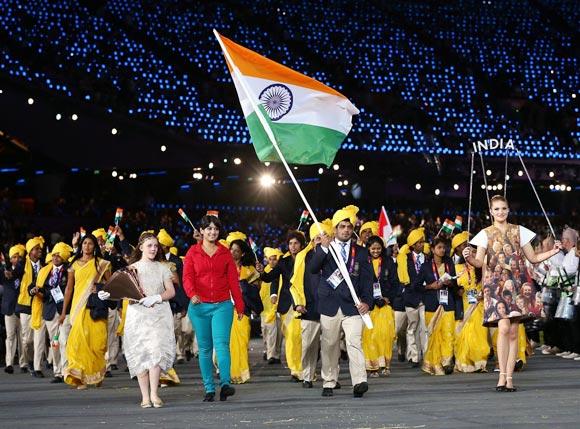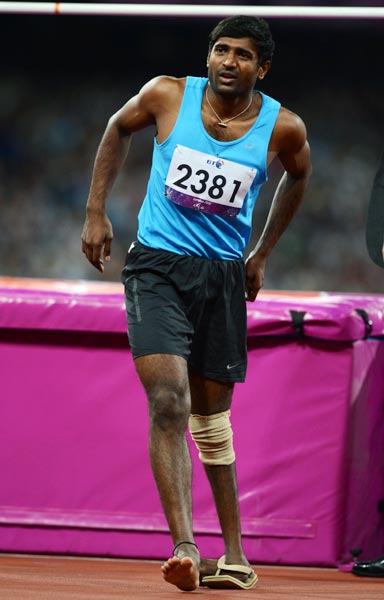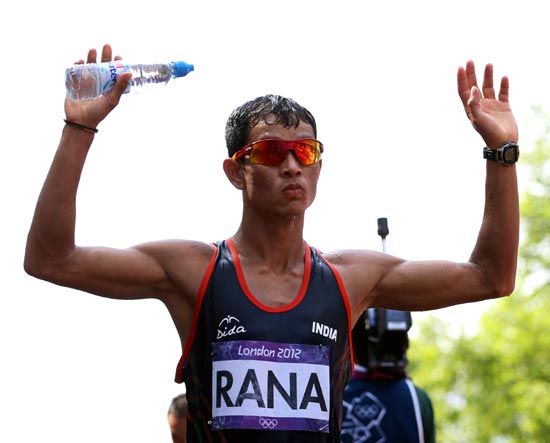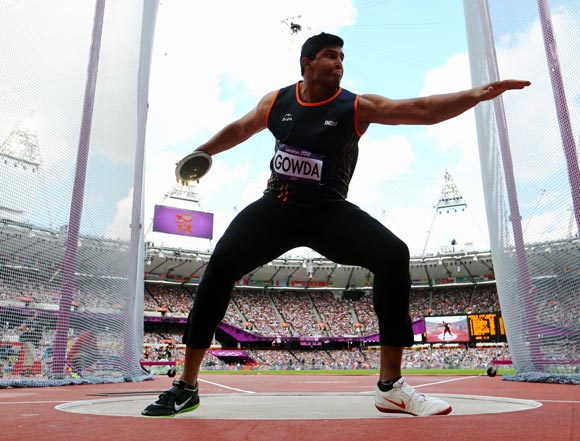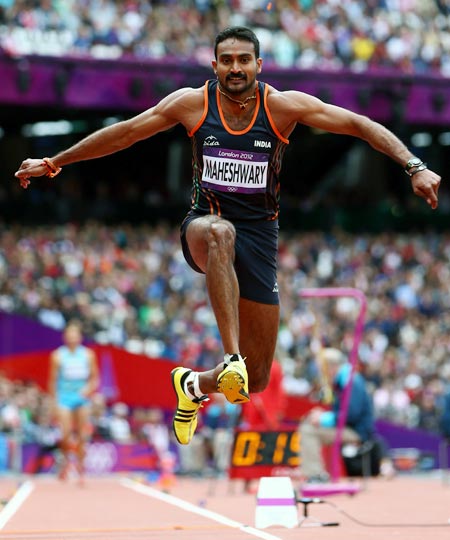 | « Back to article | Print this article |
Dope, Olympic flopshow mar Indian athletics in 2012
Indian athletics slumped to new depths of shame by producing the highest number of dope cheats while continuing the flopshow at the Olympics in yet another dismal year.
- London Olympics an unforgettable tapestry of tears, drama
If 2011 was the year of worst doping scandals in Indian athletics involving six top quarter-milers, the year gone by brought another dubious low with the country producing the maximum dope cheats according to record books of the world governing body, the IAAF.
On the field, there were expectations that the 14-strong contingent would fight for a medal in the London Olympics but their campaign ended in the usual disappointing manner.
Most of them seemed to be just content making up the numbers and getting the Olympian tag.
Girisha clinched a silver medal in the men's high jump
What the able-bodied could not do was, however, achieved by differently-abled Girisha Hosanagara Nagarajegowda, who clinched a silver medal in the men's high jump F42 event in the London Paralympics which were held just after the main Games.
Girisha, who has an impairment in his left leg, sailed over a height of 1.74m in the final of the event to finish second behind Iliesa Delana of Fiji. Though Girisha's barefoot scissor leap matched that of gold medallist Delana, he had to settle for silver for taking more jumps. F24 event was meant for athletes with an impairment that affects their arms or legs.
The 24-year-old son of a daily wage labourer from a little known town of Hosanagara in Karnataka became the toast of the country for a brief while with cricket icon Sachin Tendulkar describing him "an inspiration" for the people of the country.
Rana created a national record in 50km race walk
Elsewhere, the woes continued with the Sports Ministry asking the Athletics Federation of India (AFI) to amend its constitution and re-conduct the polls under the Sports Code to three top posts in two month's time or face de-recognition.
The unprecedented amount of money spent by the government for their foreign training and competition seemed to have gone down the drain as 14 athletes, except for two walkers, came up performances much below their personal best.
K T Irfan punched above his weight in 20km race walk by finishing 10th with a national record and he was rubbing shoulders with the lead pack in the event for a large part of it. Basanta Bahadur Rana also created a national record in 50km race walk though he finished 36th.
Poonia, Gowda failed to shine at the London Olympics
Only Krishna Poonia and Vikas Gowda could feature in the final round of women's and men's discus throw though the duo were well short of their personal best. They looked like shaping up well before the Olympics but failed to lift themselves during the greatest spectacle on earth.
Poonia and Gowda created new national records in the run-up to the Olympics with the latter topping the IAAF top performers chart for a brief while early in the season.
The seventh and eighth place finish gave Poonia and Gowda the distinction of only the sixth and seventh Indian track and field athletes to be in the final round of an Olympic event.
Maheswary returned with three foul attempts in the triple jump
The likes of Mayookha Johny, Tintu Luka and Om Prakash Karhana, who shattered a 12-year-old national record in shot put just before the Olympics, came a cropper.
Renjith Maheswary was the worst as he returned with three foul attempts in the men's triple jump. Sahana Kumari brought up the rear in the women's high jump.
The poor performance of the Indian athletes led to the AFI mulling over participation by only 'A' standard achievers in Olympics besides also making special efforts to groom walkers for possible medals in future.
London no-show was no surprise as India are the perennial laggards in athletics at the world stage. But what came as a shock was the country heading the IAAF list of dope cheats with 40 returning positive in the tests conducted by the IAAF and NADA in the last three years.
India has never won an athletics medal in the Olympics
India has never won an athletics medal in the Olympics with just seven athletes having reached the final round of an event but it beat the top-ranked nations in doping with the country contributing 40 out of 204 dope cheats worldwide.
The list includes the likes of double Asian Games gold medallist Ashwini Akkunji who are now serving a two-year ban for doping.
A NADA disciplinary panel had handed a lenient one-year ban on the six quarter-milers, including Akkunji last year, on the ground that they did not know that the food supplement they took contained prohibited substance.
That raised hopes that they could qualify for the London Olympics. But on appeal by the IAAF, the Court of Arbitration for Sports ruled, just a month before the London Olympics, that they should be banned for two years provided under the rules. They will now serve the ban till June-July next year.
The AFI drew flak for the London show as well as for the dope menace but another blow came to it at the fag end of the year with the Sports Ministry's notice.
The Ministry was not happy with a provision in AFI Constitution that only an existing member of the Executive Committee should seek election to the post of President/Secretary. It also directed the AFI to re-conduct elections for the post of president, secretary and treasurer within a period of 60 days, or 28 February 2013, whichever is earlier.
